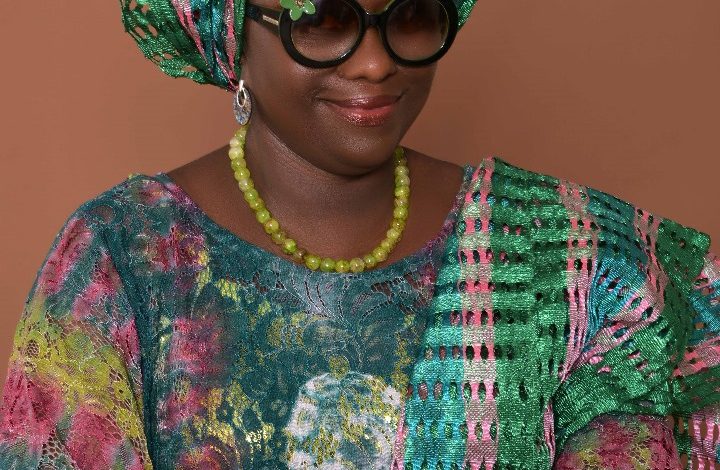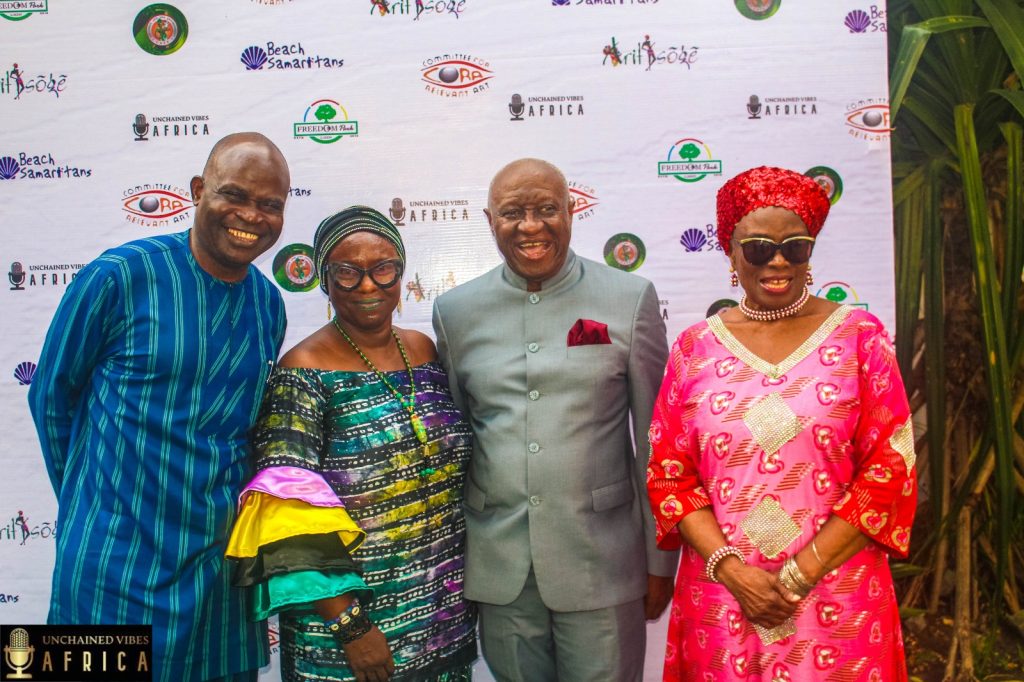I’m receiving my flowers and wreaths while I’m alive, says Sola Alamutu

Our life is about the collective, that’s how women are wired, to look after the collective, says Dame Taiwo Ajai-Lycett
Girl-child education is very important, and we must take it seriously, says Anikulapo
‘Men always think they have to have boys to keep their names’
By Anote Ajeluorou
THE near-day long festivity in Sola Alamutu’s honour for her 60th birthday was rounded off at the main stage at Freedom Park, Lagos Island, with performances and a party, where stage and screen matriarch Dame Taiwo Ajai-Lycett, culture communicator Mr. Jahman Anikulapo, singer Idris Abdulkarim and others paid her glowing tributes. Her old schoolmates from Queens College and Methodist Girls College were also present. But it was her colleague and Executive Directive at Unchained Vibes Africa (UVA), organisers of Freedom Vibes 8:0 in her honour, Mr. Ayo Ganiu that set the tone for the tribute. The event also afforded Alamutu, also fondly called the Green Queen, a moment to relive her growing up years and how she became passionate about the environment, children and art.
Mr. Ganiu had told the audience at colloquium, “This event is organised in honour of one of us, someone very dear to our hearts, who has really done so much for humanity and for what she stands for. Her name is Sola Alamutu, aka Green Queen.” Ganiu add, “Freedom Vibes is a series of events geared towards civic engagement, advocacy and artistic freedom of expression – the freedom for artists to express themselves without being censored, without being restricted, without being chained. And that’s why our name is Unchained Vibes Africa. The vibes are our movies, our music, our visual arts and everything that represents who we are and what our creativity is.”
“I remember that song that says ‘celebrate me while I’m still alive’,” Alamutu said while acknowledging her admirers, who had come to celebrate with her at her 60th. “When I got wind of this honour, that was the first thing that came to my mind. It’s an honour that I’m being honoured while I’m alive and that I’m receiving my flowers and wreaths. Thank you so very much.
“My love for social work has been from childhood. I would say I grew up with a silver spoon, as people say. But I will say I grew up with a golden spoon, and very privileged background, with all humility. And I grew up with nature, grew up caring for nature and also caring for people. I remember every single Christmas or Easter, my mum would make us pack up all the clothes we’d worn and all the curtains and make us give them all to charity. I grew up with this idea of giving, and as time went on, both of my parents were members of Lions International, with my father being a District Governor. And those who know about Rotary they know that it’s all about giving and caring and doing social works.”
Although she said she couldn’t remember when her love for the arts started, but she said it has roots in her parents’ love for art collection, which was also part of her childhood. Carting their used clothes off to charity during festivities also endeared her to children, she recalled. Alamutu’s love for the environment led her to set up the Good Samaritans, an organisation that cleans beaches and makes them inviting to local and foreign tourists alike.

CORA Chair, Mr. Jahman Anikulapo (left); ‘Green Queen’ Sola Alamutu; CORA Board Chairman, Chief Kayode Aderinokun and Dame Taiwo Ajai-Lycett at Alamutu’s 60th birthday celebration at Freedom Park, Lagos PHOTO: UVA
“The love and interest in arts, I can’t say when exactly it took off, but also from my childhood,” she recalled. “There were a lot of artworks in our house that my father collected. So it was actually natural for me to love arts. And I found myself not just being interested in paintings and all that but even clothing also. Those who know me know I love art, and I believe that like attracts like. I have people around me who like arts, like Aunty Shade here, who uses art to benefit other people and not just for themselves.
“I love children. I love nature. I love art. And so one of the first organisations I set up is called Children and the Environment (CATE). All the three aspects of life that I love, I put them together. The love for children, the love of the environment and the love of art. So I teach children and young people about the environment – keeping it clean, keeping it healthy, keeping it safe. I promote visual arts, I promote photography, I promote fashion. Aritsoge is my clothing line. I use art to get young people to do good to the society. That was how Good Samaritans, as a voluntary organisation, started.
“I get criticised by Oga Jahman that why should I clean up the beaches after the global rich had gone to mess them up? But I always say that everybody should go to the beach; it’s for everybody. So if I decided to clean it, I will get like-minded people to get it cleaned and healthy and promote tourism. People want to come into your country, and the first place they want to visit in Africa is the beach, but nobody wants to go to the beach when it’s dirty, when it’s not attractive, not healthy for anyone.”
Indeed, if you want to make the most impact in life, work with children. This maxim has been Alamutu’s moto from an early stage, as she teaches children what school curriculum doesn’t teach them – getting their hands to do inventive things that stimulate their young brains – painting, dancing, singing, planting trees, acting, cooking, etc. For her, children and the environment need nurturing for the sustainability of a healthy world. Her purpose, she affirms, is to leave the world a much better place than she met it using the arts.
“So I get children to do interesting things in art; we draw, dance, cook, act, etc. They are playing, but they are also learning. The beauty of it all is that quite a few people have started their own clean-ups after joining the Good Samaritans and from looking at what I do. So those are the things that I have passed on to others from what I do through the arts. I believe that we’re in this world for a purpose. My purpose is to leave the world better than the way I met it. And I chose to do that through the creative arts, because that is what I’m interested in. Art is everywhere; art is life.
“So you just choose the particular aspect of life that you can use to do anything. Talking is an art; public speaking is an art; dressing well is an art; dancing is an art. Deciding on what to wear and putting it all together is an art.”
Alamutu also spoke about her advocacy work, how her hatred of injustice and discrimination in any form activates her appetite to fight them with all she’s got.
“And from there is my advocacy,” she said. “One thing that I detest is injustice and discrimination of any kind. From when I was in college in Sheffield in the UK, and there was Apartheid; I remember we protested even though it was in faraway South Africa. Our school’s social centre, we wanted to change it to a protest ground, and there was a lot of resistance from the school. But we sat down there and succeeded in doing it. That encouraged people like me to want to do more and more social justice work. To get good things done sometimes, you need to go out there and sometimes put yourself in danger, not that I advise it, but if you’re like me, come along in the work of advocacy, like DJ Switch at Lekki Tollgate, who put her life in danger. I protest against injustice; I protest for anybody from being cheated for any reason, particularly artistes. Most times, artists are not taken seriously. For most people, it’s just talking; it’s just drawing, just dancing, but they don’t know that there’s a lot of work behind it.”
One knotty issue that keeps bothering Alamutu and her colleagues at UVA is how to get more women involved in using their creative talent for social engagement, which was what informed the theme for Alamutu’s celebration. ‘Inspiring Women to Drive Social change through the Arts’. But young women have Alamutu’s model to copy to sharpen their social change vision through the arts, and she simply told them, “I believe that from the outcome of what will be discussed today (see the colloquium reports), a lot more women will use their arts for social change.”
AT the main stage, where several speakers took turn to eulogise Alamutu, with Dame Ajai-Lycett rousing Nigerian women to their historic duty of inspiring the country to rise above its current state of anomie to greater heights, saying only women possess the magic wand to make a difference since men have failed in over 60 years of trying.
“I have known Sola Alamutu a long time,” she said. “I knew her father, a hotelier, a friend of mine in London. Eventually, we met at Committee for Relevant Art (CORA); she’s an indefatigable, determined worker. She’s a leader. All the women I see here know what it is to be a leader. You rule our world. Sola is an example of powerful ladies; don’t forget that. I want to appeal to us to change our world, our own Nigeria. It’s within our power to do that. Transform Nigeria; inspire the young. Sola has been doing that for a long time.
“I always admire her at CORA. May you live a long, prosperous, inspiring life! Continue inspiring lives. Thank you for being part of my life. Thank you for the contributions that you have made. Thank you for holding the flag up. Thank you for keeping the Alamutu name absolutely in the forefront. You know, men always think they have to have boys to keep their names. Sola is an example of the power of women; she’s still carrying the Alamutu name.
“I want to thank women for the contributions you make to keep this country going. And I want to appeal that you will not relent in the work that we do to get this country back. I love you, the men, but I’m sorry you ain’t gonna do it. You’ve done it for 60 years or whatever you’ve been at it. So it’s up to us women to help get the country up, to inspire, to make a difference in our lives, and not do what some women in politics now are doing, in terms of ideology, in terms of commitment to this country. It’s the nature of women to look after the family. Our life is not about us; it’s about the collective. That’s how women are wired, to look after the collective. So let’s pass this on to our children, to our men. I’m in my 80s, and I’m still rocking. There’s nothing impossible for us, because the definition of success is service. Let’s remember that.”
ALSO, Anikulapo, who has known Alamutu for some 30 years, testified to her staying power in the pursuit of her passion, and sued for special care and education of the girl-child and the need to protect her from predatory males.
“I think I’ve known Sola Alamutu close to 30 years, since in the 1980s, but we started working together in the 1990s,” Anikulapo reminisced. “We still work together. We saw her just coming around us and offering to help us, but we were suspicious. Who offers help just like that? But the Green Festival she introduced has become a big part of what we do at Lagos Book and Art Festival (LABAF). Although we like to claim credit, but I think the biggest and most credit-worthy part of LABAF is the Green Festival. We have hundreds of children every year coming to be part of the festival. We didn’t feel the impact until we started having over 1,000 children. Then we told her we were going to increase the festival to one week. That was overwhelming.”
Although they’ve worked harmoniously together since, there are still some areas they still don’t agree on, as he told the audience, “There are so many things we don’t agree on. Number one; I don’t agree you should be cleaning beaches. It’s ideological for me. Children of the Yahaya Bellos of this world go to mess beaches up and Sola Alamutu the great shouldn’t be the one cleaning up after them. Let the children of the Yahaya Bellos go clean up the beach. Ideologically, I disagree. They should clean it up. But I support you because it’s you. Every other dream that you have I will support you.”
Anikulapo listed areas Alamutu has made and continue to make impact, especially in Nigeria’s culture festival circuit, saying, “We sent her to the Port Harcourt Book Festival, when Rainbow Book Club was starting it, and also when Ake Book and Art Festival was also starting in Abeokuta. She was there, just on her own, not being prompted.
“The most important thing about her for me is the question of pedigree. It’s what she’s bringing to the table. Yes, a question of pedigree. She has a very solid foundation. And this speaks to all our parents and guardians. The submission of all this for me is that girl-child education is very important, and we must take it seriously. It’s very important that we pay attention to girl-child education. We cannot allow the boys to mess them up in a vicious circle.”



